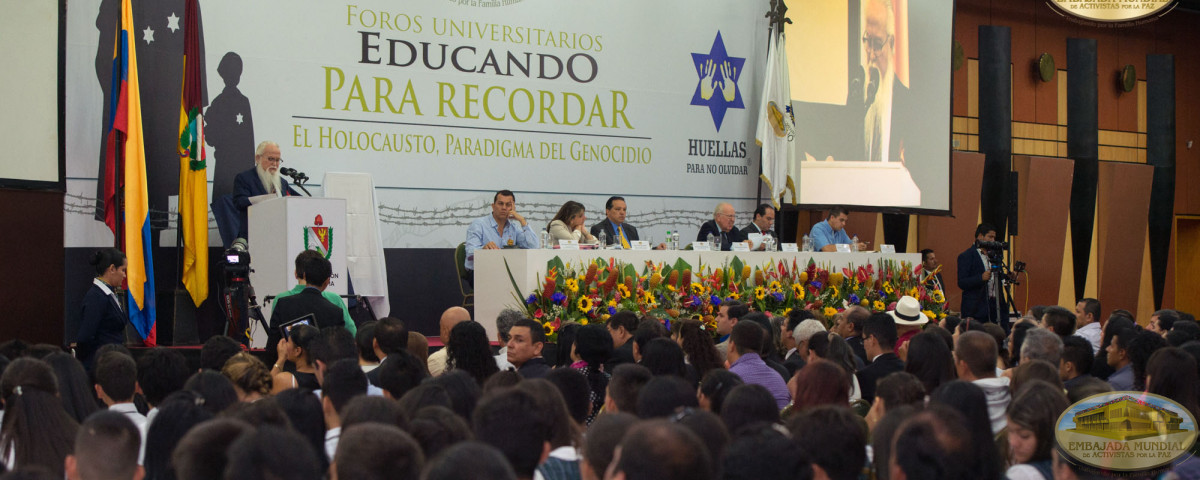Academic encounter "Educating to Remember" promotes the Holocaust as a life lesson in Ibagué
Between 1,100 Colombian authorities and students participated in the forum and witnessed the unveiling of the plaque "Traces to Remember" of Mr. Helmut Levy
A encounter with the reality of the Holocaust of World War II was held in Ibagué, municipality of Tolima, Colombia, through the University Forum "Educating to Remember: The Holocaust paradigm of genocide", which is being developed by the Global Embassy of Activists for Peace (GEAP), at an international level, as a line of action for the "Educating to Remember" project, with the aim of promoting human rights education, universal values and principles, for the construction of peace. (See: Educating to Remember: Why teach about the Holocaust?)
More than 1,100 people, including students from different colleges and universities of the municipality, as well as politicians, academics, diplomats, peace activists, entrepreneurs, among others, attended the forum held at the Convention Center of the Governorship of Tolima "Alfonso López Pumarejo".
Dr. William Soto, Executive Chairman of GEAP; Dr. Carlos Osorio representative for Colombia of the Andean Parliament; Dr. Jackeline Shapiro, historian; Mr. Helmut Levy, Holocaust survivor; Dr. Harold Urrea, deputy of the Assembly of Tolima; engineer Iván Sarmiento, national coordinator of GEAP; and Dr. Luis Carlos Salinas director of the Observatory of Peace of the University of Tolima, participated and formed part of the table of honor.
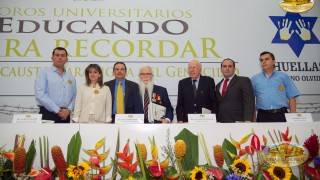
The educational encounter began with a tour of the audience, through the photographic gallery that chronologically shows the genocidal barbarism, during the German Nazi era between 1933 and 1945; this space of reflection was enlivened with the notes of the soundtrack of the film Schindler's list, interpreted by members of the Conservatory of Music of Ibagué, known as the musical city.
The educational encounter began with a tour of the audience, through the photographic gallery that chronologically shows the genocidal barbarism, during the German Nazi era between 1933 and 1945; this space of reflection was enlivened with the notes of the soundtrack of the film Schindler's list, interpreted by members of the Conservatory of Music of Ibagué, known as the musical city.
Through this initiative, the GEAP works to keep the memory of the Holocaust alive as a lesson in life, in order to recognize the alarm signals that may prevent future genocide. (See: Project Traces to Remember)
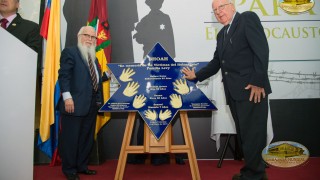
Holocaust education must appeal to the heart
Dr. William Soto, author of the project, in his speech, called for reflection on the Holocaust as an undeniable crime, but not against a single people, but against the whole human family; in this sense, he emphasized that Holocaust is an education tool to promote respect for human dignity, differences and cultural diversity, as well as to disseminate constitutional principles for the protection and defense of human rights.
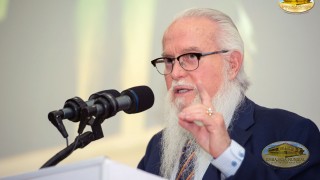
"The teaching of the Holocaust as a paradigm of genocide, should not be directed exclusively to reason, it must also appeal to the heart of each individual, where all ethical and moral values and principles are strengthened, which once introjected are externalized by each person in their environment, in relating with their fellow men."
"Understanding is impossible, but remembering is necessary"
With this phrase, Dr. Jackeline Shapiro, a historian and lawyer at the Hebrew University of Jerusalem, began a historical account of the events that took place in the Shoah (catastrophe-a Hebrew term used to refer to the Holocaust). In her dissertation, emphasized:
"Most of Hitler's landlords, incredibly, had not only undergraduate degrees, but also postgraduate degrees; and that's when you say: What good is education if it is not full of values?"
With this reasoning, she questioned the education received by the Nazis, who despite their extensive knowledge and culture, were able to commit these acts and cover their faults, on the grounds of being in compliance with their military orders; it is then, when she reaffirms, that no military establishment, however legal it may seem, can be an excuse to attack human life.

A living testimony of the Shoah
In an emotional way, the surviving Helmut Levy narrated part of his history and of the different events that happened during World War II, being a living testimony of the Holocaust, who arrived in Colombia in 1939 with his parents and brothers after fleeing the most persecution atrocious story.
"As entire towns were destroyed, killing the population, another section of the Nazi army carried out the genocide of millions of Jews, who were tortured and then sacrificed in the gas chambers, concentration camps in Poland and other countries", he said.
Mr. Helmut expressed his gratitude for the opportunity to keep alive the memory of his people and to make known the reality of the Shoah through these events.
Do not dehumanize the human: genesis of human rights
Dr. Luis Carlos Salinas, as the maximum representative of the Observatory of Peace and Human Rights, of the university center of Tolima, in his participation, defined the Holocaust as "the separation between reason and love", also said:
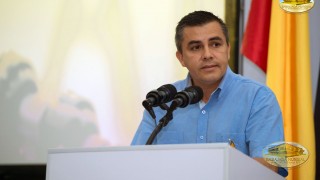
“Law is rational and in the name of law many crimes against humanity, especially in oppressive systems, are often committed."
He also explained that the dehumanization of another, part of a being that has been dehumanized, and said: "This is the genesis of human rights: not dehumanizing the human."
For his part, Dr. Carlos Osorio, representative to the Chamber for the department of Tolima, said: "One of the great problems and difficulties that exist in the world, and in Colombia, is the lack of historical memory (...) education is the key"; in this sense, he called on young people to change history, to be pioneers in carrying the flag of stable and lasting peace not only in the country, but throughout the world.
Social links for the recognition of Human Rights
These events organized by the GEAP, in coordination with various State agencies and civil society, allow the creation of social links for the promotion of the lessons of the Holocaust, through the testimony of survivors, exhibitions, analyzes and debates, in related to the subject, as well as other initiatives that promote the teaching of this genocide, in order to promote the recognition of Human Rights, respect for human dignity and social justice, to achieve harmonious and peaceful coexistence among all members of the human family.
For the GEAP, turning the Holocaust into a topic of study allows it to draw from it universal teachings transmitted in schools and universities as an effective tool to prevent and avoid the future commission of genocidal acts that exacerbate evil, hatred and intolerance that some human beings can express against their peers.
These forums are continuing throughout Latin America to keep alive the memory and history of the events and people who suffered the devastation and extermination, to conclude that there are no reasons to justify dehumanization.
